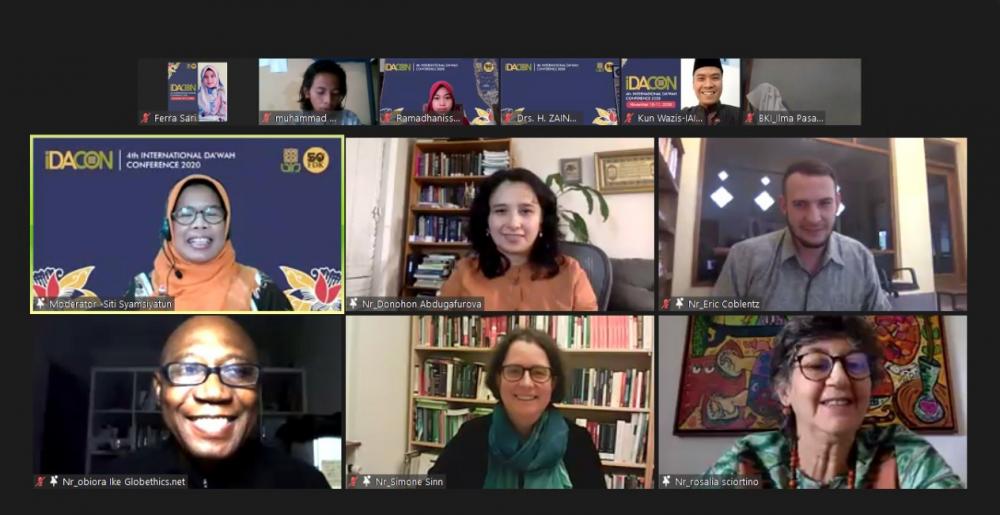Various knowledge of Islamic Innovations were discussed in iDACON 2020, Online Media as a Tool of Social Change in this Pandemic.

Faculty of Da’wah and Communication, UIN Sunan Kalijaga Yogyakarta held the 4th International Da’wah Conference (iDACON) 2020 with the theme of “Da’wah Innovation for Prosperous Society: From Indonesia to the World”. This international conference which had 853 participants took place for two days, from 10 to 11 of November 2020. The first day of iDACON 2020 was presented with seven key speakers. The Indonesian speakers were represented by Prof. Dr. Hj. Marhumah, M.Pd and Prof. Dr.phil. Al Makin, M.A. While the remaining 5 speakers came from four continents. Two people were from the United States, one person from Switzerland, one person from Nigeria, and the other one from Thailand. This event was hosted by a moderator Dr. Siti Syamsiatun, a professor in the Faculty of Dakwah and Communication, UIN Sunan Kalijaga. On the second day, there were 27 research papers from researchers all across Indonesia presented.
Prof. Dr. Hj. Marhumah, M.Pd stated that in the era of new media, an increase in the struggle for religious authority occurs in many social media spaces. It is marked by the appearances of popular and conservative da’i utilizing social media that induce reaction from the moderate group to present an opposing discourse, and thus the struggle for religious authority occurs. The next speaker was Prof. Dr.phil. Al Makin, M.A., the Rector of UIN Sunan Kalijaga. In his speech, Prof. Al. Makin quoted Habermas who asserted that public spaces play an important role in democracy to become a place for the citizen to convey their aspirations discursively. It happened in Indonesia along with the fall of the new order and the rise of the reformation era. The Rector also expressed his appreciation for the implementation of iDACON 2020 and hoped that all participants could receive benefits from this event.
Dr. Rosalia Scortino from Mahidol University, Thailand in her presentation entitled “Social Movement in the Digital Context” stated that the digital era, on one hand, may weaken the collective movement because it turns humans to become more individual, but digital media on the other hand may also become a driver in a social movement. Afterwards, Dr. Donohon Abdugafurova from Wake Forest University, USA presented a material entitled “Cultivating Islam in Uzbekistan: Challenges and Strategies of Uzbek Women Preacher’s”. According to Dr. Donohon, female da’is from Uzbekistan face quite a complex challenges including the questionable knowledge, restricted activities, the difficulty of seeking common ground with politics, and heavy burden.
Eric Coblentz, a doctoral candidate of ICRS Yogyakarta from USA, delivered a presentation entitled “Islam in Indonesia: An Image of Hope for the World”. Eric explained that Indonesian people grow morally bound with nature, by which they believe that nature possesses the authority to maintain balance. Thus, the concept of Islam Nusantara which brings unity of tradition, religion, and science is born. There was also Rev. Dr. Simone Sinn from Lutheran World Federation, Switzerland who discussed a material entitled “Missiology in the Context of Multireligious, Multiracial, and Multicultural Society”. Simone stated that the main problems of missiology and dakwah are fragmentation, hegemony, and also violence. In this case, solutions such as empowerment, justice, and peace are necessary.
The last presentation was delivered by Msgr. Prof. Dr. Obiora Ike (Okoye University, Nigeria) entitled “Higher Education as Pillar for Creating Justice and Prosperous Community”. He stated that higher education is a means of educating people with science to instill logic and ethics. With logic and ethics, science will produce humans who possess such a humble and great character. These presentations of materials by the speakers across nations and continents would surely broaden the perspective of all the participants. (Weni/Dimas/Panitia iDACON 2020)
